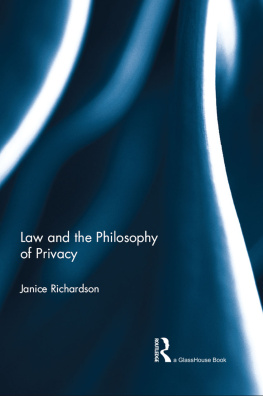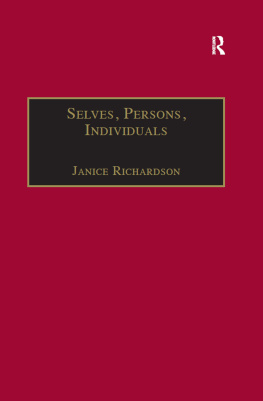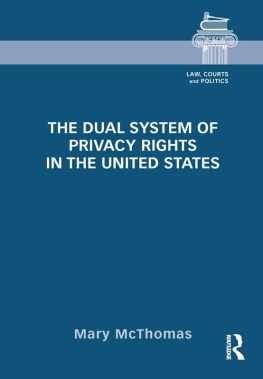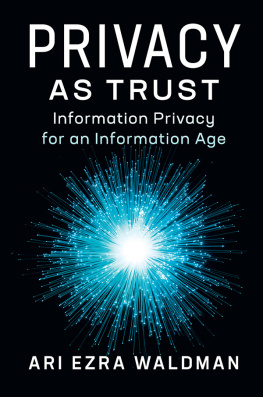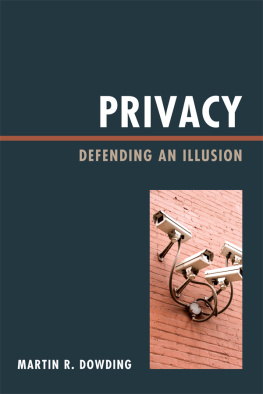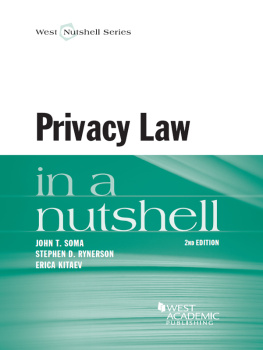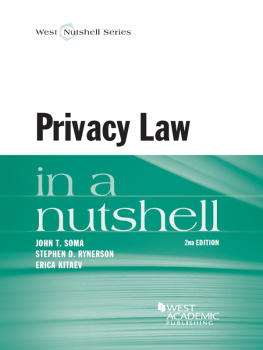
Law and the Philosophy of Privacy
Situating privacy within the context of political philosophy, this book highlights the way in which struggles concerning the meaning of privacy have always been political. Different conceptions of privacy are here shown to involve diverse assumptions about ontology: our conceptions of self, culture, society and communication. Privacy theorys debt to Locke, Kant or Mill, and what is at stake in their conceptual frameworks, is examined. The extent to which the term privacy has been used to the detriment of and to create weaker parties in marriage, in the workplace and now as citizens (or non-citizens) and consumers, as well as employees, is also demonstrated. In contrast, Janice Richardson pursues the relevance of Floridis philosophy of information, before turning to her application of Spinoza, the philosopher of communication, in order to outline a more useful framework through which to think about privacy today. The book will be of interest to those working in political philosophy, feminist philosophy, law, the philosophy of information, sociology, media, and cultural studies.
Janice Richardson is an Associate Professor in Law at Monash University. She is author of The Classic Social Contractarians (2009) and Selves, Persons, Individuals (2004); the co-editor of two books in Routledges Feminist Perspectives series; and a contributor to: Angelaki, Law and Critique, Feminist Legal Studies, Minds and Machines.
Law and the Philosophy of Privacy
Janice Richardson

First published 2016
by Routledge
2 Park Square, Milton Park, Abingdon, Oxon, OX14 4RN
and by Routledge
711 Third Avenue, NewYork, NY 10017
a GlassHouse Book
Routledge is an imprint of the Taylor & Francis Group, an informa business
2016 Janice Richardson
The right of Janice Richardson to be identified as author of this work has been asserted by her in accordance with sections 77 and 78 of the Copyright, Designs and Patents Act 1988.
All rights reserved. No part of this book may be reprinted or reproduced or utilised in any form or by any electronic, mechanical, or other means, now known or hereafter invented, including photocopying and recording, or in any information storage or retrieval system, without permission in writing from the publishers.
Trademark notice: Product or corporate names may be trademarks or registered trademarks, and are used only for identification and explanation without intent to infringe.
British Library Cataloguing in Publication Data
A catalogue record for this book is available from the British Library
Library of Congress Cataloging-in-Publication Data
Richardson, Janice, 1961- author.
Law and the philosophy of privacy / Janice Richardson.
pages cm
Includes bibliographical references and index.
ISBN 978-0-415-57243-9 (hbk) ISBN 978-0-203-51613-3 (ebk)
1. Privacy, Right of. 2. LawPhilosophy. I. Title.
K3263.R535 2015
342.0858dc23
2015011533
ISBN: 978-0-415-57243-9 (hbk)
ISBN: 978-0-203-51613-3 (ebk)
Typeset in Baskerville by
FiSH Books Ltd, London
For my mother, Mary Richardson
Contents
I would like to thank my partner Jon Rubin for all his help, support and patience. This is not only for taking away the sad encounter that is referencing but also for all our interesting discussions and his thoughts and ideas about the book. Whilst not directly involved in the book, I would also like to acknowledge the joyful encounter that is the Melbourne Spinoza Reading Group: Peter Barden, Justin Clemens, Bryan Cooke, Joseph Hughes, Joeri Mol, Chris van Rompaey, Lara Stevens and Timothy Laurie and, of course, Jon Rubin. I would also like to acknowledge my old friend, Tom Huggon, playing on Skype.
In the toilets in my favourite pub, amid the appreciations of various parts of human anatomy and declarations of love, is scrawled the line: Transparency for the powerful, privacy for the people. The phrase is succinct. It speaks to a common concern that is now both international and local. Its appearance is of its time, or perhaps a little late. Recognition that our experience of privacy is intimately related to power and hence politics was not discussed in much of the traditional privacy canon and yet is obvious today. Above all, the reference to the people registers that privacy is being undermined in ways that affect all of us in different capacities: as employees, as consumers and as citizens or residents, as well as those in more marginal positions such as welfare recipients, prisoners and refugees.
The aim of this book is to examine the political philosophies and ontologies that underlie the way that privacy has been experienced and described; to consider what is at stake in these frameworks; finally to suggest theoretical concepts that are potentially more fruitful. These ontologies involve, not only how we think about information but also how we envisage ourselves, our conceptions of who we are. I trace the development of struggles over privacy by examining the history of political thought, along with illustrations of how ideas about privacy have been influenced by (and, in turn, have influenced) legal and other power relations. As such, this book does not add to the many technical or legal suggestions as to how intrusions upon privacy should be regulated in specific areas of life. It delves beneath and beyond these to trace the assumptions about privacy and selfhood on which these conflicts are based, along with the political philosophies in which they are situated.
The dominant image of privacy in the West has been liberal, drawing on an idea of a private sphere in which the state (and others) could not intervene. Today this image is challenged by a number of different political frameworks, ranging from those that I argue are problematic, specifically neo-liberalism, (which, as Wendy Brown (2003) has argued, has come to displace liberalism in some countries, particularly in the US) through to those I find promising. These include the new: Luciano Floridis insights Spinoza does not write about privacy. I apply his work to show how it can guide us in this area. I am able to do so because Spinoza is a philosopher for whom communication is central (Balibar 1997). Spinoza was born in the same year as Locke and his work has never had the overt level of influence that Lockes has enjoyed, though there has been a contemporary resurgence of explicit interest in him. Whereas both liberalism and neo-liberalism both claim Locke as their inspiration, Spinozas historically neglected and anathematised work provides an alternative to Lockes individualism. My aim, therefore, does not involve trying to define privacy, outside of a particular context. Instead, I look back at the history of political (and ontological) thought. This gives me the tools both to produce ways of thinking differently about privacy, and to understand what is at stake in the ways in which privacy arguments are framed today. In particular, these arguments depend upon how we think about selfhood in relation to others.
There are numerous definitions of privacy. While I consider these definitions within my initial discussion of what I acknowledge as the canon of philosophy of privacy, this search for the essence of privacy is not my approach. I am less concerned with teasing out a legal or moral definition, than looking at the philosophical underpinnings in diverse contexts; to ask: what is
Next page
